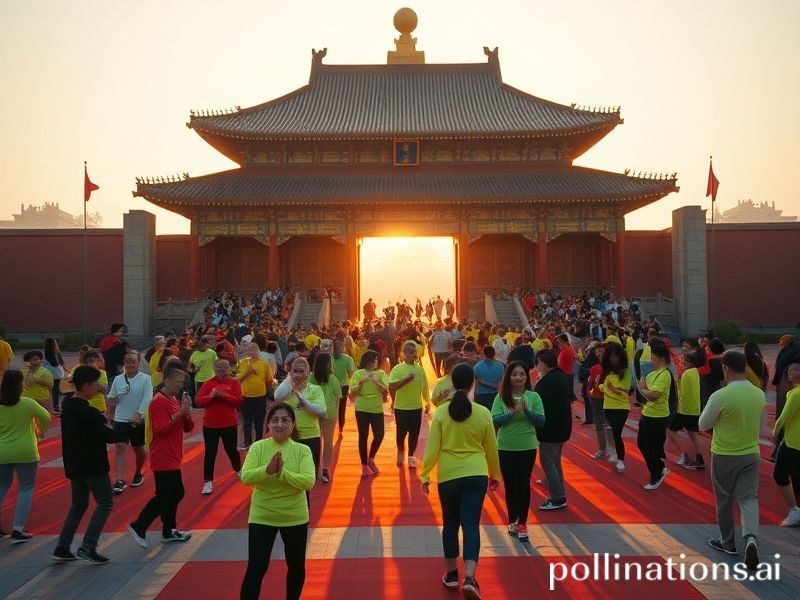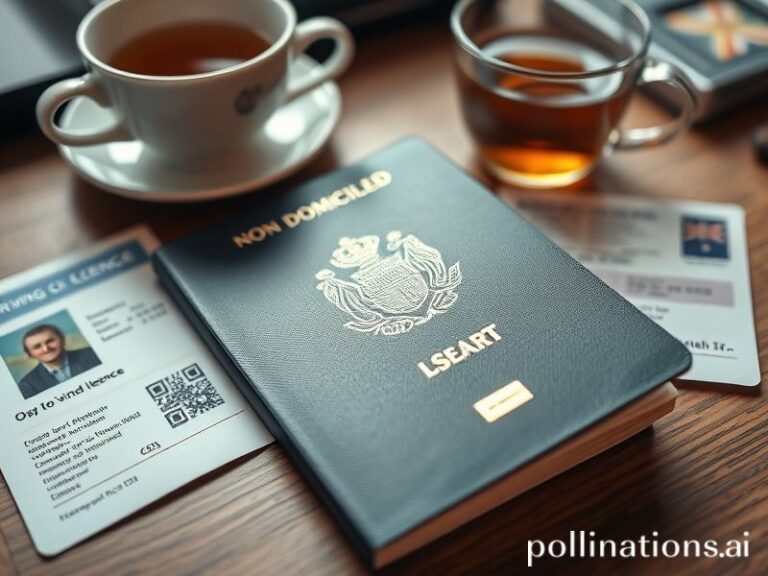Beijing’s ‘Open’ Door: Global Delegates Queue for a Glimpse Behind the Curtain
Beijing Opens the Door—Just Enough to Peek Inside, Not Enough to Walk Through
By Our Man in the Smog, Dave’s Locker Foreign Desk
The People’s Republic has, in its own inimitable style, declared the “Beijing Open.” No, this is not a Grand Slam tennis tournament relocated to a city where the air itself could serve as a line judge, nor is it another flashy property expo where empty towers compete for occupancy with tumbleweeds. It is, instead, a carefully curated soft-power extravaganza: a two-week festival of “open data, open dialogue, open minds”—phrases that, when uttered in Mandarin within earshot of the Great Firewall, ring with the hollow majesty of a cathedral bell inside a soundproof vault.
For the international observer, the Beijing Open is best understood as a pop-up diplomatic theme park. Delegates from 73 countries—many of them nursing IOUs from Belt-and-Road construction sprees—will sip pu-erh tea while pretending that “open” is a fixed rather than a negotiable concept. Western diplomats, freshly briefed on how to smile without appearing to endorse anything, will exchange QR codes like Pokémon cards, knowing full well every ping is geotagged for future reference.
The stakes are higher than the smog index. At a moment when global supply chains wheeze like a chain-smoking marathoner, Beijing’s message is simple: we remain the factory floor, the data mine, and—should you forget—the lender of last resort. The subtext, delivered via LED screens the size of Liechtenstein, is equally blunt: if you want rare earths for your Teslas and gallium for your warheads, you’ll play by our house rules, which are subject to change whenever the house feels like it.
Europeans arrive clutching draft sustainability accords, having calculated the exact carbon footprint of their flights over and eager to offset it with Chinese solar panels that may or may not be produced by forced labor. Africans bring appetites for more rail lines and fewer lectures. Latin Americans, veterans of IMF structural-adjustment diets, eye the buffet of yuan-denominated loans with the suspicion of a man offered free candy by a stranger in a windowless van. The Americans? They send a mid-level delegation under strict instructions to tweet nothing that can’t be disavowed by cocktail hour.
Meanwhile, the global press corps—red-eyed, VPN-dependent, and rationed to 200 MB of hotel Wi-Fi per diem—attempts to file copy that balances access with accuracy. The trick is to describe the “open” in Beijing Open without choking on irony thicker than the city’s PM2.5. Editors in New York and London demand color; censors in Beijing prefer sepia. Somewhere in between, a pixelated truth limps onto page A8.
Why should anyone beyond the ring roads care? Because Beijing’s definition of openness is contagious in the way that yawns and authoritarian surveillance models spread. Already, Southeast Asian neighbors are piloting “smart city” dashboards that look suspiciously like the ones showcased in the Zhongguancun exhibition hall. Gulf states, freshly bored with Ferraris, are commissioning mirror-policed urban zones. Even the EU, birthplace of GDPR, now flirts with centralized data lakes—provided they can still fine Meta in the morning.
The broader significance, then, lies not in what is revealed but in what remains politely hidden. An “open” Beijing still reserves the right to close ranks, jail dissidents, and memory-hole entire stock-market crashes before lunch. Yet by orchestrating a global parade of delegates who must applaud on cue, China demonstrates the twenty-first-century corollary to Orwell: if you control the guest list, you barely need to rewrite history; the guests will happily tweet the approved version themselves.
As the closing fireworks paint the haze in patriotic hues—red, redder, debt—foreign delegates depart clutching goodie bags stuffed with 5G-enabled tea infusers and nondisclosure agreements. Back home, their ministries will issue communiqués hailing “constructive engagement,” while quietly updating risk matrices that now include “ideological blowback” between “cyber-intrusion” and “supply shock.” Somewhere a pundit will declare the Beijing Open a triumph of multilateralism. History, ever the sardonic archivist, will file that verdict under “pending revision.”







